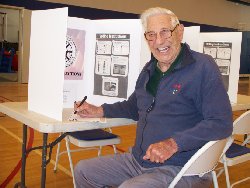BRYCE ON POLITICS
- And may very well violate the Constitution.
To use this segment in a Radio broadcast or Podcast, send TIM a request.

The impeachment inquiry of President Trump has taken center stage in the political campaign of 2020, even to the point of overshadowing press coverage of the Democrat presidential candidates. The inquiry focuses on a statement from an alleged whistle-blower who expressed concern regarding a telephone call the President had with the incoming President of the Ukraine. As of this writing, the whistle-blower's identity remains anonymous. Frankly, we do not know if this is one person or several as the complaint appears to have been written by a team of lawyers. As a result, the President and his representatives cannot ask questions of his accuser.
I have tried to look at this from both sides, Republican and Democrat, and took the position; what if this was President Obama being impeached and not President Trump? Be it Republican or Democrat, I came to the same conclusions.
The protection of the whistle-blower's anonymity could easily be construed as in conflict with Amendment 6 of the
Constitution (Rights of Accused in Criminal Prosecutions; the "Confrontation Clause"); to wit:
"In all criminal prosecutions, the accused shall enjoy the right to a speedy and public trial, by an impartial jury of the State and district wherein the crime shall have been committed, which district shall have been previously ascertained by law, and to be informed of the nature and cause of the accusation; to be confronted with the witnesses against him; to have compulsory process for obtaining witnesses in his favor, and to have the Assistance of Counsel for his defense."
This applies to criminal cases, not civil. I tend to see impeachment as a rather serious situation, after all it is reserved for "high crimes and misdemeanors." It is also something we have considered only a handful of times in our republic's history, yet we have never removed a president from office.
Frankly, we all know it will not happen as the Senate will inevitably come to the president's defense and dismiss the charges coming from the House. The question remains, is impeachment a criminal case or civil? In all examples over the years, it has been treated as a heinous crime, which leads me to believe it is criminal and the President is being prohibited from facing his accuser(s).
Our history is littered with stories of whistle-blowers, such as in 2013
Edward Snowden, the NSA contractor who ignited the U.S. surveillance program scandal. There are also the whistle-blowers involved with the Benghazi scandal and the IRS intimidation program. Whistle-blowers have actually been with us a long time. In my life, it goes back to Daniel Ellsberg who in 1969 released the
"Pentagon Papers" to the "New York Times," detailing the military activity in Viet Nam under LBJ and Nixon. This, of course, ultimately triggered
Watergate.
However, let's go a little further back in time to 1925 when the Army instigated a court-martial against
Colonel Billy Mitchell, an episode which has quickly been forgotten in history, but has an important bearing on the whistle-blowers of today.
Although Mitchell is primarily credited for building Air Power in this country, his military career goes as far back as the Spanish-American War where he served as the youngest Army officer (at age 18). Mitchell's notoriety though began during "The Great War" (WWI) where, as Major, he became the first American officer to come under fire in the trenches of France. During the war, he earned several decorations and citations. More importantly, it was in France where he developed his fascination and passion for the airplane as a military weapon.
Mitchell understood the potential of the airplane. His superiors did not, and saw it as nothing more than a trivial instrument for observing enemy forces. They laughed at him when he claimed airplanes could sink a ship by dropping bombs on it. At the time, battleships were considered invincible. He finally got an opportunity to prove his claim and sank the German battleship "Ostfriesland" which was to be scuttled following the war. Nonetheless, the military was unimpressed. Following the war, in peacetime, there was an emphasis on shrinking the military. Even though Mitchell begged for money for research and development, he was ignored. He even urged the military to form a separate branch dedicated to an air service, but was denied. Consequently, American Air Power diminished almost to obscurity. The English, French, Italians, even the Germans had far superior airships than the Americans, and Mitchell made sure the newspapers knew about it.
Knowing Mitchell's image was growing larger in the press, the military sent him on remote assignments in order to eliminate his exposure in the press. In 1924 he was sent to study military defenses in the Pacific. During this time, he visited Japan and witnessed firsthand how the Japanese were embracing Air Power and realized America was far behind their counterparts. Following his tour he produced an extensive 323 page report on his assessment of American defenses in the Pacific. It was in this prophetic report that he predicted how Japan would attack Pearl Harbor with remarkable accuracy. Even though the military dismissed his report as ridiculous, Mitchell's predictions would come true 17 years later. Nonetheless, he was buried again by the military.
One year later, in 1925, the Navy dirigible "Shenandoah" was destroyed in a storm in Ohio, with a loss of thirteen lives. Mitchell was outraged as he knew the ship was archaic and denounced the Navy for its "almost treasonable" attitude towards aviation:
"As a patriotic American citizen, I can stand by no longer and see these disgusting performances...at the expense of the lives of our people and the delusion of the American public. We may all make mistakes but the criminal mistakes made by armies and navies, whenever they have been allowed to handle aeronautics, show their incompetence...This, then, is what I have to say on the subject, and I hope that every American will hear."(1)
Although Mitchell became a hero to the American people for his bold statements, his superiors felt otherwise and court-martialed him for insubordination. Actually, the court-martial was what Mitchell was hoping for as he figured it was the best way to bring attention to the problem and create change. The case garnered a lot of attention in the press, and many notable proponents of Air Power testified on his behalf. In the end though, Mitchell was suspended from the Army for five years. Instead, Mitchell resigned in 1926 and spent the remainder of his life speaking on behalf of Air Power. He would die in 1936 never knowing how accurate his predictions would become in World War II. In 1942, President Roosevelt, recognized Mitchell's contributions to Air Power by restoring his status and elevating him to the rank of Major General. In 1946, he was awarded the Congressional Gold Medal, "in recognition of his outstanding pioneer service and foresight in the field of American military aviation"...10 years after his death. Today, this medal bears his likeness on it.
There are some similarities, as well as differences, between Billy Mitchell and today's impeachment whistle-blower(s). Mitchell was a visionary who used his court-martial to draw public attention to the problems of Air Power. Today's whistle-blower is not a visionary. He/She/They just stumbled on a problem and reported it. Whereas Mitchell stood and took his medicine as a military officer, thereby garnering the support of the American people, the impeachment whistle-blower(s) hid behind anonymity not wanting to suffer through a career ending court case as Mitchell did.
The big problem with becoming a whistle blower is that it doesn't pay well. You might earn the admiration of the American people, but you must also face the wrath of the establishment. It takes someone with a lot of character to stand up and report a problem, whether it be in the corporate world or government. The prime difference between Billy Mitchell and today's whistle-blower(s) is simple: Mitchell stood like a courageous man and took his medicine; the whistle-blower(s) has not. Understand this though, the American Air Power we know today can be directly attributed to the efforts of Billy Mitchell. Had he not spoken up when he did, our air defenses would have been primitive by the start of World War II. Mitchell knew what he was talking about and would not be intimidated by the powers in authority. This leads me to believe today's impeachment whistle-bower(s) can be intimidated, and perhaps has been threatened by others.
In the end, the president is entitled to face his accuser, whatever his/her/their name is.
Keep the Faith!
Note: All trademarks both marked and unmarked belong to their respective companies.
 Tim Bryce is a writer and the Managing Director of M&JB Investment Company (M&JB) of Palm Harbor, Florida and has over 40 years of experience in the management consulting field. He can be reached at timb1557@gmail.com
Tim Bryce is a writer and the Managing Director of M&JB Investment Company (M&JB) of Palm Harbor, Florida and has over 40 years of experience in the management consulting field. He can be reached at timb1557@gmail.com
Copyright © 2019 by Tim Bryce. All rights reserved.
 Thanksgiving is a favorite of mine and I have written about it on numerous occasions (see below). It's more than just the food, it's about being around friends and family. It's the telling of a joke or story, a fond memory, and a glass of cheer. All of this reflects on the love we have for those who surround us, to wit...
Thanksgiving is a favorite of mine and I have written about it on numerous occasions (see below). It's more than just the food, it's about being around friends and family. It's the telling of a joke or story, a fond memory, and a glass of cheer. All of this reflects on the love we have for those who surround us, to wit... Tim Bryce is an author, freelance writer and the Managing Director of M&JB Investment Company (M&JB) of Palm Harbor, Florida and has over 40 years of experience in the management consulting field. He can be reached at timb1557@gmail.com
Tim Bryce is an author, freelance writer and the Managing Director of M&JB Investment Company (M&JB) of Palm Harbor, Florida and has over 40 years of experience in the management consulting field. He can be reached at timb1557@gmail.com Not surprising, Florida is a preferred destination for tourists in winter and retirement. We offer plenty of warm sunshine, sports and attractions, golf and tennis, boating and fishing, fine restaurants, comfortable living, no state income tax, southern charm, and aside from the occasional tropical storm, a safe and comfortable environment. People are coming to Florida in droves, either to vacation or live. It is the #1 state where people are moving to. Not surprising, we have a construction boom here.
Not surprising, Florida is a preferred destination for tourists in winter and retirement. We offer plenty of warm sunshine, sports and attractions, golf and tennis, boating and fishing, fine restaurants, comfortable living, no state income tax, southern charm, and aside from the occasional tropical storm, a safe and comfortable environment. People are coming to Florida in droves, either to vacation or live. It is the #1 state where people are moving to. Not surprising, we have a construction boom here. The snowbirds are finally back in Florida. For the uninformed, this represents the migratory habits of our elderly neighbors in the north who have developed an aversion to winters at home and head for the warmer climate of the Sunshine State for five or six months. Our restaurants thereby become overcrowded and our roads are clogged with motorists with a wide variety of driving habits, resulting in stop-and-go traffic to drive us crazy. Make no mistake though, we welcome our northern neighbors back as they represent +90 million tourists who visit us (yes, it is that much) and pump over $60 billion into our economy.
The snowbirds are finally back in Florida. For the uninformed, this represents the migratory habits of our elderly neighbors in the north who have developed an aversion to winters at home and head for the warmer climate of the Sunshine State for five or six months. Our restaurants thereby become overcrowded and our roads are clogged with motorists with a wide variety of driving habits, resulting in stop-and-go traffic to drive us crazy. Make no mistake though, we welcome our northern neighbors back as they represent +90 million tourists who visit us (yes, it is that much) and pump over $60 billion into our economy.  I have been active in politics for nearly 48 years now as a Republican and have witnessed many changes to the party over the years. I have campaigned for candidates, served on political board of directors, served as a correspondent at political events, and have written about politics for well over a decade. As a political pundit, I am pleased to have correctly predicted the outcome of the 2016 and 2018 elections, and No, I certainly didn't do it by studying the polls (which are useless).
I have been active in politics for nearly 48 years now as a Republican and have witnessed many changes to the party over the years. I have campaigned for candidates, served on political board of directors, served as a correspondent at political events, and have written about politics for well over a decade. As a political pundit, I am pleased to have correctly predicted the outcome of the 2016 and 2018 elections, and No, I certainly didn't do it by studying the polls (which are useless). The impeachment inquiry of President Trump has taken center stage in the political campaign of 2020, even to the point of overshadowing press coverage of the Democrat presidential candidates. The inquiry focuses on a statement from an alleged whistle-blower who expressed concern regarding a telephone call the President had with the incoming President of the Ukraine. As of this writing, the whistle-blower's identity remains anonymous. Frankly, we do not know if this is one person or several as the complaint appears to have been written by a team of lawyers. As a result, the President and his representatives cannot ask questions of his accuser.
The impeachment inquiry of President Trump has taken center stage in the political campaign of 2020, even to the point of overshadowing press coverage of the Democrat presidential candidates. The inquiry focuses on a statement from an alleged whistle-blower who expressed concern regarding a telephone call the President had with the incoming President of the Ukraine. As of this writing, the whistle-blower's identity remains anonymous. Frankly, we do not know if this is one person or several as the complaint appears to have been written by a team of lawyers. As a result, the President and his representatives cannot ask questions of his accuser.
 For some time we have witnessed how political correctness has affected our speech, manners, even our senses of humor and history. We are asked to forget everything taught to us as it was undeniably wrong, at least according to the far left. Normally, such antics would be dismissed as silly, but then again, there is a subliminal agenda underway here. Two recent examples remind us of how strange it is becoming.
For some time we have witnessed how political correctness has affected our speech, manners, even our senses of humor and history. We are asked to forget everything taught to us as it was undeniably wrong, at least according to the far left. Normally, such antics would be dismissed as silly, but then again, there is a subliminal agenda underway here. Two recent examples remind us of how strange it is becoming.